Search the Special Collections and Archives Portal
Search Results
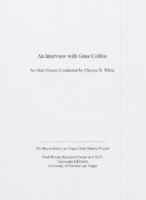
Transcript of Interview with Gene Collins, July 16, 2009
Date
Archival Collection
Description
Gene Collins served as President of Las Vegas chapter of NAACP 1998-2001. He aslso worked at the Nevada Test Site as an electrician.
Text
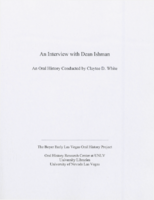
Transcript of Interview with Dean Ishman, July 2, 2009
Date
Archival Collection
Description
Dean Ishman moved to Las Vegas in 1995, becoming the Las Vegas NAACP branch president in 2003.
Text
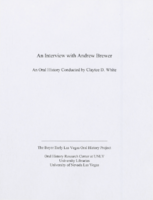
Transcript of Interview with Andrew Brewer, July 1, 2009
Date
Archival Collection
Description
Andrew Brewer became Las Vegas NAACP president in 2008.
Text
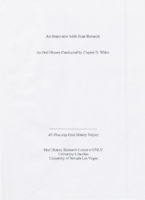
Transcript of interview with Jean Bennett by Claytee D. White, July 8, 2008
Date
Archival Collection
Description
Interview with Jean Bennett conducted by Claytee D. White on July 8, 2008. Bennett's early rock-and-roll career blossomed with music producer Buck Ram, who sold her the legal rights to the Platters in 1966. Bennett's assistant Gayle Schreiber also contributes to the interview.
Text
Audio recording clip of interview with Hattie Canty by Claytee D. White, February 27, 1998
Date
Archival Collection
Description
Part of an interview with Hattie Canty by Claytee D. White, February 27, 1998 . Canty describes picketing for employment rights with the Culinary Union and union relations with various hotels.
Sound

Transcript of interview with John and Mabel Dillingham by Sonny Le Jeune, March 19, 1978
Date
Archival Collection
Description
On March 19, 1978, John (Sonny) Le Jeune interviewed John (born 1904 in Trail Creek, Idaho) and Mabel Dillingham. The two provide many historical accounts of Las Vegas, Nevada, including John’s work on the railroad, the development of the city, and their living conditions when first moving to Las Vegas. The three also discuss prominent members of the community, recreational activities, church membership, and popular attractions around Las Vegas. Other topics include the building of Hoover Dam, the site of the Stewart Ranch, early irrigation systems, flood control, and Block 16.
Text

Transcript of interview with Roscoe Wilkes by Claytee White, March 19, 2009
Date
Archival Collection
Description
Roscoe Wilkes was born in Bonanza, Colorado, and moved with his family to Pioche, Nevada for what his sister called a 75-year pit stop. Soon after their move to this rural Nevada town, Roscoe’s mother became a widow, raising two children during the Depression. Like many families in Pioche, the Wilkes’ made due with what they had, and were creative in sustaining their livelihoods. Roscoe has never stood still. Before enlisting in the military, Roscoe worked various jobs, as a PBX systems operator, a lead zinc miner, and grade school teacher, before enlisting. During World War II, Roscoe became a prisoner of war in Romania, and was rescued a few months later when the Germans began retreating. Returning to the United States after his release, he relocated to a base in California, and married. As soon as Roscoe was relieved of his military service, he took advantage of the then new G.I. Bill and enrolled in the University of Southern California School of Law. He immediately took his degree to Pioche, soon becoming its district attorney, and later a judge. He spent 18 years based in Seattle as a federal administrative law judge, hearing cases prosecuted by the Coast Guard. Roscoe ended his 45-year career in law in 1990, and moved to Boulder City, where four generations of Wilkes live.
Text
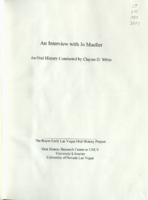
Transcript of interview with Jo Mueller by Claytee White, August 26, 2011
Date
Archival Collection
Description
Jo Ann and Hal Mueller arrived in Las Vegas in 1956 when he accepted a meteorologist position. In addition to raising their two children, Jo was active in PTA, worked for Weight Watchers, and was a volunteer with League of Women voters. She tells the story of meeting Hal and their whirlwind romance to the altar, moving to the Caroline Islands and eventually choosing Las Vegas over Seattle as their next career assignment. Las Vegas became their permanent home and Jo reflects on life and experiences here.
Text

Transcript of interview with Sara Denton by Claytee White, July 13, 2015
Date
Archival Collection
Description
Sara Denton loves life, laughter, and wonderful adventures. She is the mother of four children, a Distinguished Nevadan, lover of books and art, political campaign organizer, community activist, and friend. Sara is one of the founders of Boulder City’s most successful philanthropic fundraisers, Art in the Park. Denton was born in Paducah, Kentucky, into a family of readers and thinkers. Therefore, when the opportunity arose, at 18 years of age, to move the Washington, DC to work in the Signal Corps, she seized the opportunity. From the vantage point of her apartment, she could see the Secret Service assisting Franklin D. Roosevelt into his limousine at the back door of the White House. His polio was hidden from the public but this diversion allowed Sara and her friends to greet and be greeted by their hero. While in DC, Sara worked for General Hayes and one day struck up a conversation with a young soldier, Ralph Denton. Soon they married and moved to his home state, Nevada. After several years in Elko, NV, the Dentons moved to Las Vegas where Sara worked in the campaigns of Grant Sawyer, Howard Cannon, and Alan Bible. Moving the family to Boulder City though, was the wisest relocation by the family because the children grew up in a caring community with good schools. And the city provided the opportunity for Sara’s creativity to flow in many directions including travel, entrepreneurship, philanthropy, and community building efforts. This interview is filled with laughter. I enjoyed the conversation.
Text

Loreta C. Monson interview, March 1, 1979: transcript
Date
Archival Collection
Description
On March 1, 1979, Jon J. Howard interviewed Loreta Monson (b. April 10, 1904 in Egypt, Idaho) about her life in Las Vegas, Nevada. Monson speaks about coming to Las Vegas, the layout of the city and Fremont Street. Moreover, Monson talks about the Mormon church in Las Vegas, politicians and Nellis Air Force Base. Lastly, Monson discusses leisure activities, recreational activities such as fishing, and the Old Ranch.
Text
